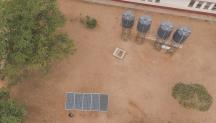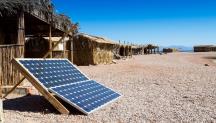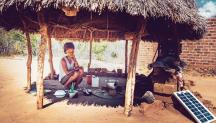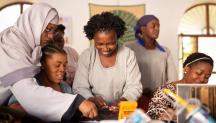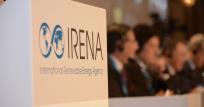

Renewable Energy Can Help Reach 100% Electrification
Newsletter
Sustainable energy is the golden thread that connects economic growth, increased social equity and an environment that allows the world to thrive.”- United Nations Secretary General Ban Ki-Moon on the launch of the Sustainable Energy for All initiative
During IRENA’s fifth Assembly today, delegates engaged in a programmatic discussion on off-grid renewable energy deployment. Four years ago, The UN launched the Sustainable Energy for All initiative to meet the goal of providing electricity to 100% of the global population by 2030. While progress has been achieved in this area, with 1.7 billion more people connected today than in 1990, there is still a long way to go.
To reach 100% electrification, the rate of electricity infrastructure expansion must double.
According to Kandeh Yumkella, Special UN Representative of the SE4All initiative speaking from the panel today, off-grid solutions, both as mini-grids and standalone systems, will provide the greater share of additional generation necessary to achieve universal electricity access within the next 15 years.
“Large fossil-fuel projects take 3-5 years to deliver electricity. Smaller, off-grid renewable energy projects can bring power to the people much faster. They must be the way forward.” - Kandeh Yumkella
Renewable energy technologies are cost-competitive, mature, modular, adaptable, secure, environmentally sustainable and accessible. IRENA’s work on costings, illustrated in a Renewable Power Costs Plummet Many Sources Now Cheaper than Fossil Fuels Worldwide , finds that renewable energy technologies are the most cost-competitive option for electrification in many rural areas and islands. Large reductions in the cost of technology – nearly 80 percent for solar PV technology since 2008, for example – have made renewables significantly cheaper than diesel-fired generation or kerosene-based conventional lighting in off-grid areas.
26 million household are already served by off grid renewable energy, 20 million through solar home systems, 5 million through renewable energy-based minigrids and 1 million through small wind turbines.
There are still significant barriers however that countries must overcome to implement off grid systems including:
- Ideology: In order to scale up deployment, the ideology needs to move from a project to project approach, to a market-level approach with targeted incentives and enabling policies.
- Finance: We currently invest USD 9 billion a year on energy access, but USD 45 billion is needed to achieve universal access (but funds like ADFD are helping bridge this gap).
- Capacity building: Adequate training and education are needed to support local implementation and decrease independence on foreign know-how.
The session introduced a Working Paper on Off-Grid Renewable Energy Systems which outlines some of the challenges and opportunities with off grid electrification.
